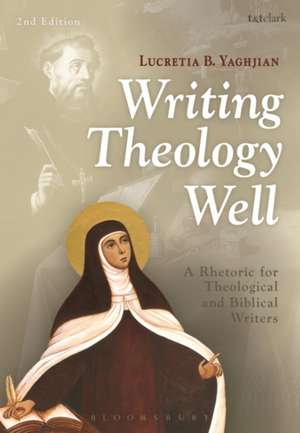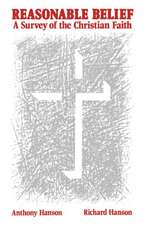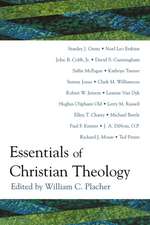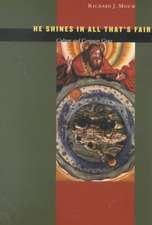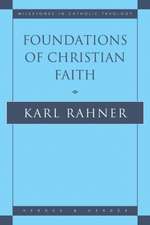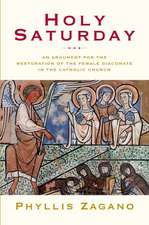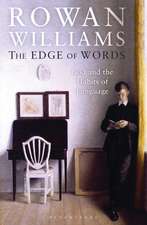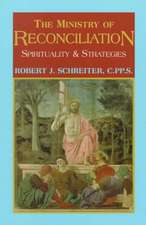Writing Theology Well 2nd Edition: A Rhetoric for Theological and Biblical Writers
Autor Lucretia B. Yaghjianen Limba Engleză Paperback – 23 sep 2015
This 2nd Edition includes new chapters on 'Writing Theology in a New Language', which explores the linguistic and cultural challenges of writing theology well in a non-native language, and 'Writing and Learning Theology in an Electronic Age', addressed to distance learning students learning to write theology well from online courses, and dealing with the technologies necessary to do so.
| Toate formatele și edițiile | Preț | Express |
|---|---|---|
| Paperback (1) | 196.14 lei 3-5 săpt. | +65.58 lei 4-10 zile |
| Bloomsbury Publishing – 23 sep 2015 | 196.14 lei 3-5 săpt. | +65.58 lei 4-10 zile |
| Hardback (1) | 724.31 lei 6-8 săpt. | |
| Bloomsbury Publishing – 23 sep 2015 | 724.31 lei 6-8 săpt. |
Preț: 196.14 lei
Preț vechi: 221.89 lei
-12% Nou
Puncte Express: 294
Preț estimativ în valută:
37.54€ • 40.76$ • 31.53£
37.54€ • 40.76$ • 31.53£
Carte disponibilă
Livrare economică 01-15 aprilie
Livrare express 15-21 martie pentru 75.57 lei
Preluare comenzi: 021 569.72.76
Specificații
ISBN-13: 9780567499172
ISBN-10: 0567499170
Pagini: 472
Dimensiuni: 169 x 244 x 28 mm
Greutate: 0.91 kg
Ediția:Revised
Editura: Bloomsbury Publishing
Colecția T&T Clark
Locul publicării:London, United Kingdom
ISBN-10: 0567499170
Pagini: 472
Dimensiuni: 169 x 244 x 28 mm
Greutate: 0.91 kg
Ediția:Revised
Editura: Bloomsbury Publishing
Colecția T&T Clark
Locul publicării:London, United Kingdom
Caracteristici
Students
and
lecturers
praised
the
1st
Edition's
reader-friendliness
and
usefulness
as
a
'theological
writer's
companion'
Notă biografică
Lucretia
Yaghjianis
Director
of
the
The
WRITE
Program
at
Episcopal
Divinity
School,
USA
and
is
on
Adjunct
Faculty
of
the
Boston
College
School
of
Theology
and
Ministry,
USA.
Cuprins
Part
I:
Writing
Theological
Rhetorics
Well1.
Writing
Theology
Well
in
ItsOwn
Context2.
Writing
Theological
Reflection
Well:
Rhetorics
of
Process,
Problem-Solving,and
Proclamation3.
Writing
Theological
Argument
Well:
Rhetorics
of
Inquiry,
Reading,Reflection,
and
Persuasion4.
Writing
the
Theological
Essay
Well:
Rhetorics
of
Identification,Correlation,
Suspicion,
and
ConstructionPart
II:
Writing
Theological
andBiblical
Research
Well5.
Writing
Theological
Research
Well:
Rhetorics
of
Research,
Investigation,and
Documentation6.
Writing
the
Biblical
Essay
Well
I:
Rhetorics
of
Exegesis
and
Interpretation7.
Writing
the
Biblical
Essay
Well
II:
A
Critical-Hermeneutical
RhetoricPart
III:
Toward
a
Theological
Style
andVoice
of
One's
Own8.
Writing
Theology
Well
in
a
New
Language9.
Rewriting
Theology
Well
I:
Rhetorics
of
Style
and
Voice10
Writing
with
Theological
Imagination
Well:
Rhetorics
of
Analogy,
Metaphor,and
Symbol11.
Rewriting
Theology
Well
II:
A
Rhetoric
of
RevisionPart
IV:
WritingTheology
Well
in
Widening
Contexts
12.WritingTheology
in
a
New
Language:
Rhetorics
of
Communication,
Enculturation,
and
Empowerment13.
Writing
Theology
Well
4.0:Writing
and
Learning
Theology
in
an
Electronic
Age
Recenzii
It
is
imperative
that
theologians
learn
to
write
coherently
and
with
ready
access
for
a
general
audience
-
and
not
simply
for
each
other.
No
one
can
help
us
to
do
this
better
than
Lucretia
Yaghjian.
This
volume
will
tutor
all
theological
writers
to
write
in
more
reasonable
ways.
Writing Theology Well has been my go to text to recommend to theological students and writing resource centers since its publication. Not only does Lucretia Yaghjian have incredible technical skills as a teacher of the craft of writing, but she brings to the task a deep passion for the subject matter, as well as a compassionate understanding of fledging theological and biblical writers. At its best this book evokes the "voice" and imagination of the student while it instructs in rhetoric. This welcome new edition updates this valuable book, including writing in digital environments. It is an invaluable resource for students, faculty, librarians and theological educators everywhere.
In 2006 I wrote that the first edition of this book on writing theology was incomparable in its combination of theory practice, quality, depth and style. And now, almost ten years later, Lucretia Yaghjian expands the breadth of her coverage to second-language English writers and to all of us caught up in a comprehensive digital environment. In a brilliant and yet transparent way she leads young and mature theologians into a new technological and cultural context of teaching, studying and writing. She has taught this old dog new tricks, and I am grateful.
What a wise book! What a pleasant book! What a helpful book! The book reflects Yaghjian's special background, literature as it is well and interestingly written, graced with a conversation with leading figures in the field. There is in this book so much practical wisdom concerning the craft of writing. For a beginner, an absolutely necessary guide; for those who have been writing for years, a welcome and informative reminder of what makes theological writing readable and pointed. This should be required reading for graduate students (and their teachers).
Writing Theology Well has been my go to text to recommend to theological students and writing resource centers since its publication. Not only does Lucretia Yaghjian have incredible technical skills as a teacher of the craft of writing, but she brings to the task a deep passion for the subject matter, as well as a compassionate understanding of fledging theological and biblical writers. At its best this book evokes the "voice" and imagination of the student while it instructs in rhetoric. This welcome new edition updates this valuable book, including writing in digital environments. It is an invaluable resource for students, faculty, librarians and theological educators everywhere.
In 2006 I wrote that the first edition of this book on writing theology was incomparable in its combination of theory practice, quality, depth and style. And now, almost ten years later, Lucretia Yaghjian expands the breadth of her coverage to second-language English writers and to all of us caught up in a comprehensive digital environment. In a brilliant and yet transparent way she leads young and mature theologians into a new technological and cultural context of teaching, studying and writing. She has taught this old dog new tricks, and I am grateful.
What a wise book! What a pleasant book! What a helpful book! The book reflects Yaghjian's special background, literature as it is well and interestingly written, graced with a conversation with leading figures in the field. There is in this book so much practical wisdom concerning the craft of writing. For a beginner, an absolutely necessary guide; for those who have been writing for years, a welcome and informative reminder of what makes theological writing readable and pointed. This should be required reading for graduate students (and their teachers).
